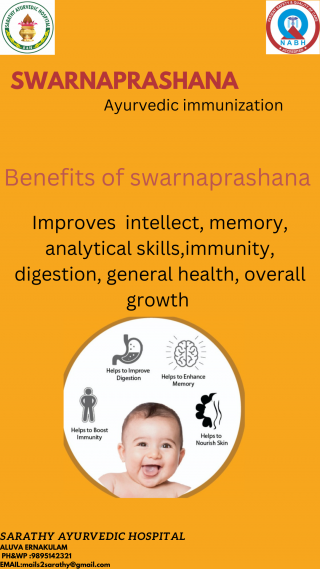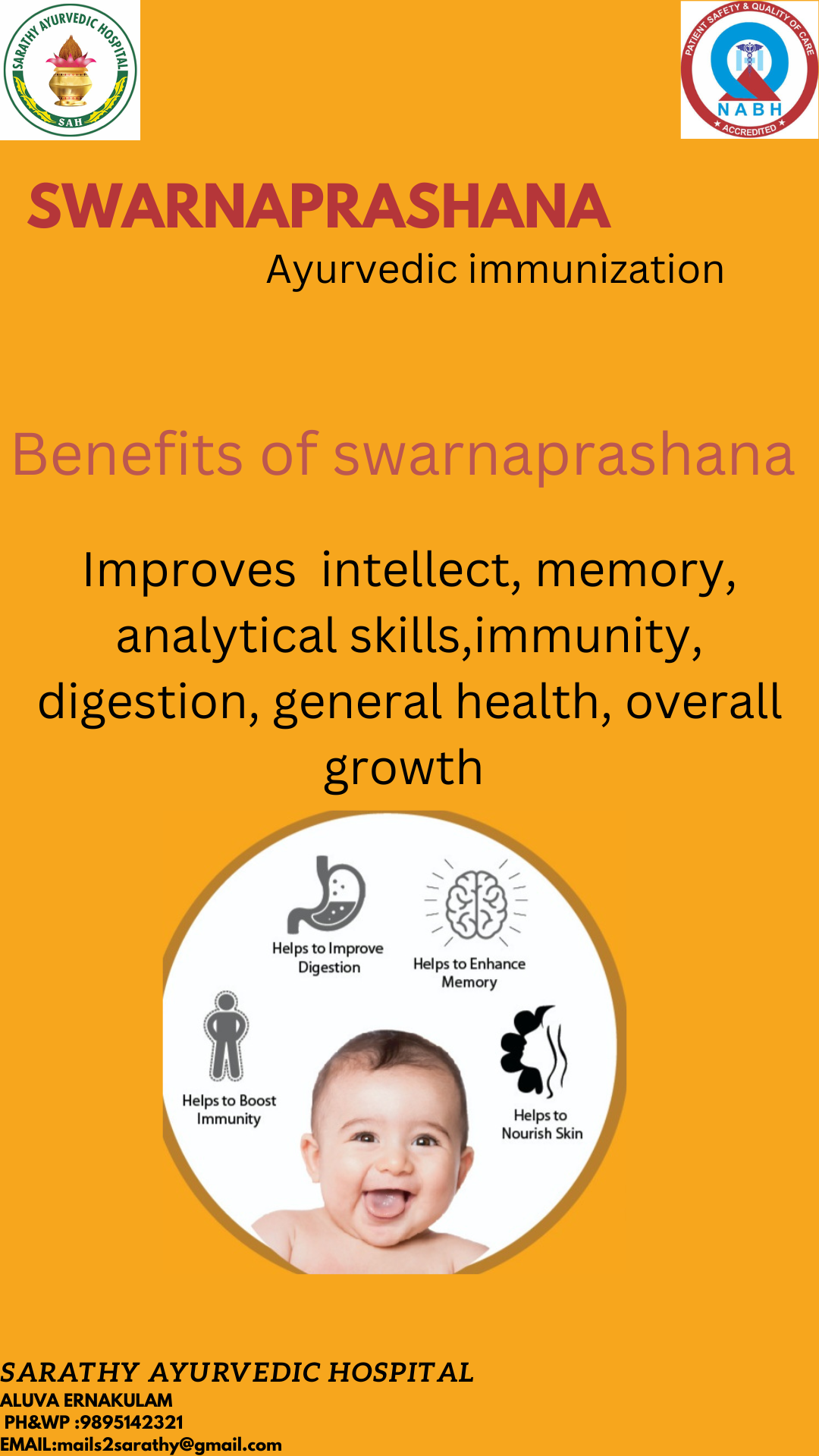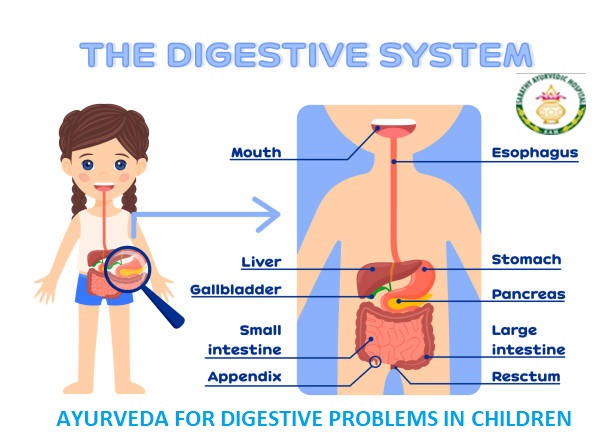What is the meaning of Ayurveda child therapy program of Swarnaprashanam?
Swarna means gold. Prashana is to lick and swallow. Systematic monitored oral administration of processed colloid gold with proper adjuvant vehicles to children is Swarnaprashanam. The therapy is a special contribution towards child health from Koumarabhrithya, the paediatrics specialty of Ayurveda to the world. Swarnaprashanam is referred to as Swarnaprasha, Suvarnabinduprasha, and Swarnamrutaprasha
What are the health benefits of colloidal gold present in Swarnaprashanam medicine?
Gold is one among the seven purest metals considered as safest for consuming and is indicated for preventive and curative purposes. The clinical efficacy as a brain tonic is peaked when administered as Swarnabhasma or gold ash with the clinical attributes of antioxidant, anti-depressant, anti- cancerous, anti-bacterial and anti-rheumatoid and nervine stimulant
Studies have proved various health benefits for colloidal gold both in children and adults. Colloidal gold is anti-Inflammatory, anti-aging and enhances cellular regeneration at the optimal pace. In babies and children, it increases cognitive and brain function, memory, retention and intellect. Gold is processed through an elaborate process to get Swarnabhasma or gold ash which when processed in medicated ghee and honey attains a colloidal form
Why is Swarnaprashanam recommended for children?
Childhood is the crucial period of cognitive, emotional and physical growth of a person. During the first sixteen years of childhood human brain grows rapidly and matures into a proper human brain. Swarnaprashanam promotes and enables the process and boosts up the utilisation capacity if done the right way. Hence the practice
What are the benefits of Swarnaprashanam?
Swarnaprashanam is given in regulated doses according to age and body weight. Swarnaprashanam is an intensive therapy and has to be performed only with the prescription of a qualified Ayurveda doctor and only under the supervision of a qualified Ayurveda doctor. Done as per protocol Swarnaprashanam improves and optimizes intelligence, digestive power, strength, immunity and life expectancy. Considering the benefits, Swarnaprashanam was advocated as a spiritual process and a tradition so as to popularise it in the community. Swarnaprashanam is considered to be auspicious and it eradicates the bad evils and diseases from the child according to Ayurveda scholars especially sage Kashyapa the author of Kashyapa Samhita, the textbook of Ayurveda paediatrics
Ayurveda classics say if the baby or child is administered Swarnaprashanam for a month it enhances intellect and provides immunity against diseases. Continuous usage for a month can be effective to provide a photographic memory
How is Swarnaprashanam mixture prepared and how is it administered to children?
Swarnaprashanam mixture consists of three ingredients, Swarnabhasma, Brahmighritham and honey. All three are mixed in specific measures as decided by the doctor and ground for a specific period of time for proper assimilation. The resultant colloid is administered as drops to the child as directed by the doctor. Diet and lifestyle modifications are necessary before and after procedure to get maximum benefits and prevent adverse effects
Who can use and for how long?
Swarnaprashanam is administered from birth up to 16 years of age. At Sarathy Ayurveda the protocol is a fortified effective plan as follows
- 0-28 days: Daily administration
- 29-180 days: Alternate day administration
- 181-365: Twice a week administration
- 1-3 years: Weekly administration
- 3-12 years: Twice a month
- 12-16 years: Once a month administration
What are the contraindications of Swarnaprashanam?
Children with organ transplants and on immunosuppressive therapy should not be given Swarnaprashanam therapy due to the fear of organ rejection. Also children with liver and kidney disorders should be contraindicated for this therapy. Assessment and monitoring by a qualified doctor is a must for safe and effective Swarnaprashanam
For more details and queries on Swarnaprashanam and its benefits and to have free counseling on Ayurveda Child Heath in Ayurveda please feel free to
- Talk to Dr. Valsaladevi K and Dr. Gayatri S
- Mail us at mails2sarathy@gmail.com
- WhatsApp us on +91-9895142321
- Call us on +91-9895142321
- Do visit our social media pages Sarathy Ayurvedic Hospital on Facebook, Instagram, Twitter, and LinkedIn
SARATHY AYURVEDIC HOSPITAL DOCTORS PANEL
- Dr. Lathika PK-Specialist in Panchakarma, Stroke Rehabilitation and Ayurveda Cancer Care
- Dr. Valsaladevi K-Specialist in Panchakarma, Child Health, Ayurveda Diet, and Yoga Therapy
- Dr. Karthik K Nandan-Specialist in Conventional Orthopaedics, Marma and Varicose Veins
- Dr. Gayatri S-Specialist in Women Health, Cosmetology, and Fertility

Swarnaprashanam@Sarathy Ayurveda




